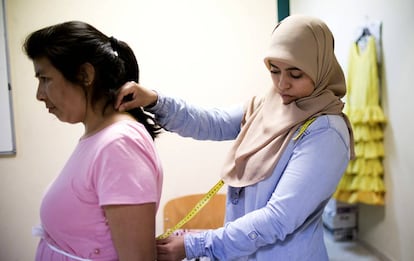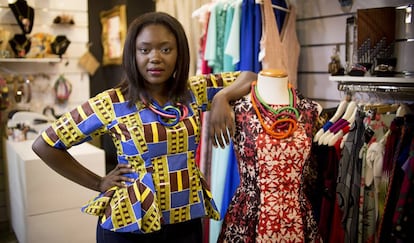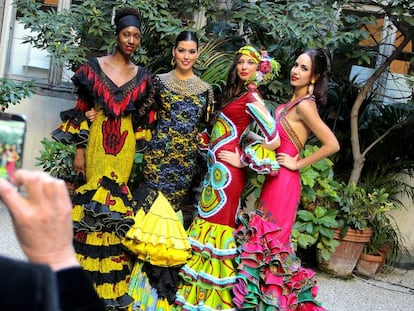When making flamenco dresses is not just a job, but a way in
African, Latin American and Arabic women are training in a sewing workshop run by a Seville foundation that offers employment opportunities and valuable contacts
Loubna Day¡¯s story sounds like a rags-to-riches Hollywood movie in which the star triumphs over adversity to become a self-made woman. Except that Loubna didn¡¯t leave her home town of T¨¦touan, in Morocco, for an ¡°American Dream.¡± Instead, she left to get her two-year-old daughter treatment for eye cancer in 2009.
Once her daughter was on the mend, Loubna started to learn Spanish and to study the application requirements of a micro-credit program that makes small loans to people without financial means who are keen to set up a business. She then signed up for a sewing course and learned to make flamenco dresses fit for the famous April Fair in Seville.
¡°The Seville Fair was like discovering a new world and I wanted to learn how to make the outfits,¡± she says. This year she made two dresses, one yellow ¨C for the teacher¡¯s sister ¨C and one pink, which she hopes will be the first of many.
This workshop puts them in touch with other women, gives them a job and the possibility of working for themselves
Esther Aguilera, social worker
With two sewing machines purchased at Lidl supermarket and the dedication of Ana Vera and Chelo Garc¨ªa, two volunteer teachers from the Seville Acoge Foundation, a handful of African, Latin American and Arabic women are learning the tricks of the trade at the foundation¡¯s sewing workshop. Though Seville Acoge has 30 years of experience working with immigrants, the sewing workshop is a new initiative that ?started two years ago.
¡°The women don¡¯t have a family-and-friend network to fall back on for help with their children or professional contacts,¡± says social worker Esther Aguilera. ¡°This workshop puts them in touch with other women, gives them a job and the possibility of working for themselves.¡±
Unemployment among immigrants in Spain is 25%, a full 6% above the national average, according to the last Labor Force Survey (EPA). And according to Spain¡¯s National Statistics Institute, unemployment stands at 40% among Moroccans, the largest foreign community in Spain. ¡°Being an immigrant isn¡¯t in itself an obstacle to starting a business, but the lack of a support network makes it much harder,¡± says Aguilera.

The foundation started the initiative in order to help immigrant women with diverse needs. Some had to learn Spanish, others wanted to meet women dealing with the same challenges as themselves, and yet others already knew how to sew, but wanted to make flamenco dresses professionally.
¡°The first time I saw a flamenco dress was back home,¡± says Loubna, 32, who has hardly missed a single class at the workshop. ¡°I kept thinking about it, because I had no idea how to make it¡±.
Her teacher Chelo taught her the basics: how to take measurements, make the pattern, cut the fabric, sew both by hand and machine, and stitch the frills and other details. And that was just the start. ¡°Making a pattern is the most complicated part for them because it involves every sewing technique,¡± says Chelo.
The two women who asked for the yellow and pink dresses brought Loubna the fabrics and told her what they had in mind. In a couple of fittings, the dresses were ready and the women put them on for the first time at the 2017 April Fair.
Loubna can¡¯t claim all the credit, though. Kenana Alsalti, a 63-year-old Syrian refugee who worked as a fashion designer in Damascus, helped with the yellow dress.
The Seville Fair was like discovering a new world and I wanted to learn how to make the outfits
Loubna Day, Moroccan immigrant
Already an expert seamstress, Kenana signed up for the workshop to learn sewing lingo in her adopted tongue. She still struggles with the language, but every time she makes a mistake she shakes her head and tries again. ¡°The dress is a lot of work, but it was easy for me,¡± she says.
¡°Loubna is coming along, but she needs a formal qualification,¡± says Chelo, referring to the fact that although she can learn the basics of flamenco fashion in the workshop, the next step would be to qualify as a professional dressmaker. To this end, the foundation is getting in touch with companies, flamenco fashion houses and the regional government of Andalusia to help fund their prize student.
¡°Loubna¡¯s a hard worker and a perfectionist and she¡¯s also punctual¡ I only have good things to say about her,¡± says her teacher, who notes that, with her rather serious demeanor, she is not fazed by the admiration of the other women.
This seriousness contrasts with the Seville mannerisms she has picked up, such as ending every other word with the diminutive suffix ¨Cito, but the heat stops her from wearing a flamenco dress herself. As far as her prospects are concerned, she takes a philosophical view. ¡°Any job starts little by little,¡± she says.
The African angle
Meanwhile, Mamy Awa Thioune, a Senegalese-born woman living in Seville, runs the flamenco clothing company Lago Rosa. Like many small businesses, it was born out of need. When Mamy fell pregnant in 2015, she couldn¡¯t get a job and so decided to try out an idea she had nursed since she was little: making flamenco dresses from wax print fabric, a colored cloth from Ghana. ¡°I never thought a black woman could not design these dresses,¡± says Mamy. ¡°The flamenco world offers a lot of scope.¡±

Brought up in the San Jer¨®nimo neighborhood of Seville, Mamy dances sevillanas and gets into her flamenco gear every year in April. She says that she can design up to 10 very different dresses from the same African print. ¡°In Seville, it¡¯s the colors that get people¡¯s attention. And what could be more colorful than wax print fabric?¡± she says.
Traditionally, flamenco fashion has been dominated by Spanish designers, but Mamy believes there¡¯s room for her. This year, two dresses made from her fabrics were shown at the Seville Fair. And she¡¯s getting an entire collection ready for the 2018 event. ¡°At the fair, they all tell me, ¡®Look! A black woman dressed in a flamenco dress! So I imagine there will be the same reaction to my dresses. They¡¯ll say, ¡®Look an African flamenco dress!¡¯¡±
The New Arrivals project is funded by the European Journalism Center with support from The Bill and Melinda Gates Foundation.
English version by Heather Galloway.


